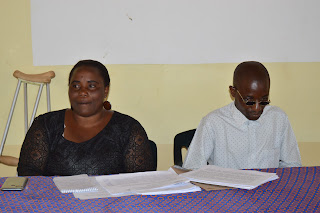TRAINING TO RAISE AWARENESS AND REDUCE DISCRIMINATION OF SOCIETY AND HEALTH CARE IN PROVIDING HEALTH CARE TO PEOPLE WITH DISABILITIES
Disability is a condition that results from a temporary or permanent physical or mental defect that limits a person's ability and equal opportunities in the performance of various social responsibilities. Such deficiencies can be exacerbated by the environment and the community's perception of disability.
In our society and elsewhere in the world a person with a disability is accompanied by stigma based on outdated traditions. As a result, people with disabilities are often seen as dependent and incapable of being helped by non-disabled people to make ends meet.
This attitude leads to the exclusion of people with disabilities in the daily lives of the community around them. This view is negative and goes against basic human rights. The Constitution of the United Republic of Tanzania insists that all human beings are equal and that they are entitled to equal rights regardless of race, ethnicity, gender and religion.
The Persons with Disabilities Act, 2010 section 26 (2) states that “Every public health facility, whether public or private, will not discriminate against any person with a disability and deprive him or her of access to quality health care and will take responsibility for ensuring that the person receives appropriate care. health.
The 2004 National Policy on Persons with Disabilities aims to bring development, justice and dignity to Tanzanians with disabilities. It also aims to provide opportunities for people with disabilities to participate in decision-making and implementation of key issues in society as well as to amend unprotected laws and provide justice for people with disabilities.
Health services for people with disabilities in Tanzania still face challenges despite the country's policies and laws calling for this group to receive free medical treatment, including priority. Some of the challenges that people with disabilities face in accessing health care include;
• Unfriendly infrastructure in health care facilities e.g. toilets, specialized means for the disabled. Some people with disabilities also lack support equipment such as wheelchairs so they are at risk of contracting the disease when they are in health care facilities.
• Language (Communication) especially for people with hearing impairments (deafness) and not speaking thus leading to challenges in communicating with service providers as many do not know sign language. Also, health education provided at health care facilities does not reach people with disabilities such as visually impaired people.
• Lack of privacy between caregivers and people with disabilities when they are sick as many have people to accompany them but also even when expressing themselves.
• Poor living conditions (poverty) that lead to some people with disabilities not being able to access quality health care due to lack of funds
• Lack of specialized literature to enable people with disabilities to read and know the diseases they are suffering from as well as the medications they should take and how to use them.
• Stigma from some service providers
• Lack of medication especially for patients who are in special groups including people with disabilities
The role of health care providers in caring for people with disabilities
• Identify and prioritize all patients with special needs as required by the policies and laws of the country
• Allocate special windows for specific groups
• Improving the infrastructure of people with disabilities in health care facilities e.g. Sanitation toilets for people with disabilities
• Prevent stigma in patients with disabilities
• Caring and lovingly caring for people with disabilities
• Provide health education to people with disabilities
• Despite national efforts to prioritize the provision of services to people with disabilities, health services in general do not meet the needs of citizens and especially people with disabilities.
• Disability is often due to health problems, poverty, poor environment, traditions and customs of the community. Despite this, a large percentage of disabilities can be prevented by improving the environment and adhering to basic health procedures. Thus the provision of primary health care should focus on preventive and community education services on environmental improvement, nutrition and education to enable citizens to protect themselves against diseases and practices that cause disability.
PREPARED BY:
HERRY SANGA
SOCIAL WELFARE OFFICER
SUMBAWANGA MUNICIPALITY








Comments
Post a Comment